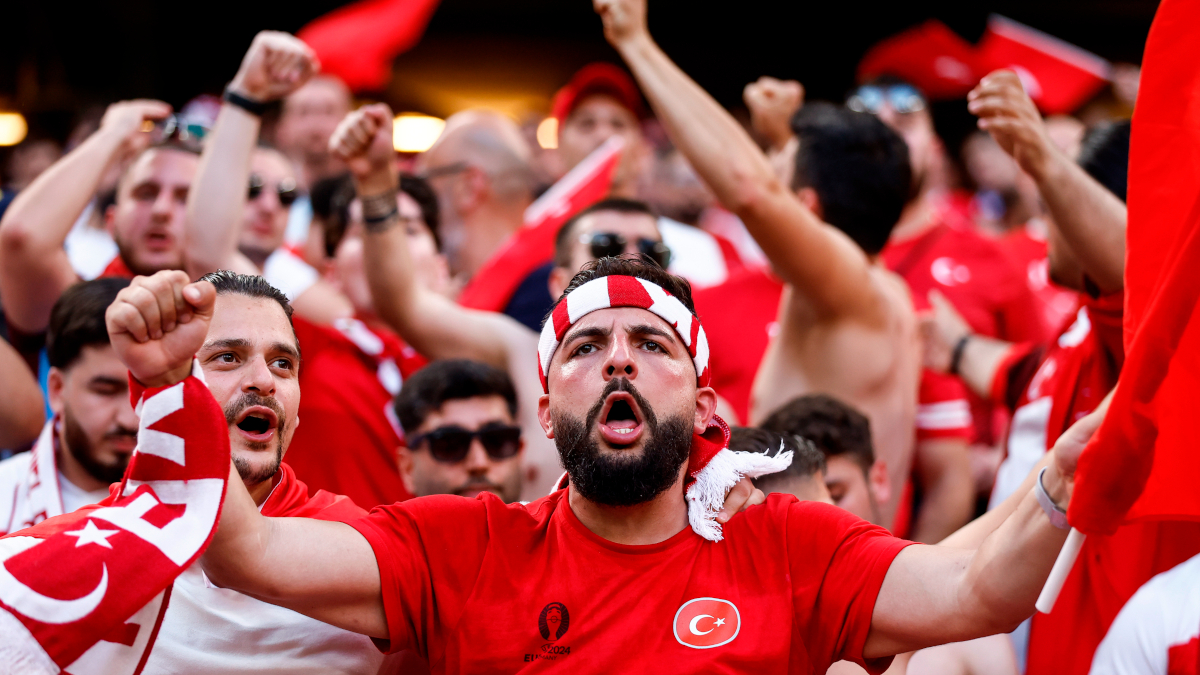Members of Berlin's large Turkish community have vowed to paint the town red when their team comes to the German capital to play the Netherlands in Euro 2024 on Saturday.
"The atmosphere will be like a home game for us," said Muhammet Ali Sevilmis, 36, who runs a phone repair shop in Berlin's Kreuzberg district.
There will be "mainly Turks in the stadium", predicted Sevilmis, who himself forked out 500 euros ($540) for a ticket after Turkey's victory against Austria to reach the quarterfinals.
"For us Turks, it doesn't really matter whether it's 100 euros more or less. The main thing is that we're in the stadium celebrating on the day," he told AFP.
Sevilmis will be joined in Berlin's Olympiastadion by Turkey's President Recep Tayyip Erdogan.
The Turkish leader has announced his attendance amid a spiralling diplomatic row over an alleged ultra-nationalist hand sign made by Turkish defender Merih Demiral during his team's win over Austria.
German officials have condemned the hand gesture and Uefa has launched an investigation for "inappropriate behaviour", prompting Ankara to hit back against the accusations as "xenophobia".
Ambassadors of both countries were summoned in tit-for-tat moves as the episode once again laid bare the political tensions that often engulf Germany's Turkish community.
With emotions expected to run high at the match, Berlin police have said they will deploy more officers, classifying Saturday's quarterfinal as a "high-risk game".
'WE ARE THE HOSTS'
But fans shrugged off the concerns, saying they are just looking forward to a nice party.
Berlin is home to the largest Turkish community outside of Turkey, many of them the descendants of "guest workers" invited under a massive economic programme in the 1960s and 70s.
Around 200 000 people with Turkish roots currently live in the city, or around six per cent of the total population.
The Kreuzberg district in particular has become a hub for Turkish culture and restaurants serving the famous doner kebab.
Kavurma-Kofte, a small Turkish eatery with a terrace on one of the main streets running through the neighbourhood, will be showing the match on a big screen on Saturday.
"It is special because many Turks live in Berlin and we will be the hosts," said owner Kemal Salis, 64.
The restaurant is fully booked for Saturday, Salis said.
"We have not seen the Turkish team in such good form for a long time. It's an atmosphere we have missed," he said.
At Imren, another Turkish restaurant nearby, the excitement was tangible.
STREET PARTY
Ibrahim Filikci, 29, was still hoarse voice from celebrating the team's win against Austria on Kurfuerstendamm, one of Berlin's main shopping avenues where thousands of Turks gathered on Tuesday night.
Arrests were reported at a previous gathering on the street, but Filikci said the mood was peaceful.
"(The street) was completely blocked off. Police were there but everything was fine. No problems, no fights, everything was great," he said.
Tahsin Yilmaz, 53, said he will be supporting both teams on Saturday, wearing half red and half orange, as his father worked in the Netherlands.
"I like the Netherlands and I want to party with them, drink with them, etc. The Dutch are very nice and friendly, you can have a nice time with them, dance and have fun," he said.
Dutch fans have brought a lively atmosphere to the tournament so far, filling German cities with their bright orange shirts.
But Sevilmis believes they will be no match for the Turks in Berlin.
"We know the Oranje. It won't be a competition, you'll understand what I mean on the day," he said.
Turks living in Germany have sometimes come under fire for their continued loyalty to the Turkish team, despite Germany having several players with Turkish roots – including captain Ilkay Gundogan.
Sevilmis, who was born in Berlin, pointed out that if all goes well for Turkey, they could eventually face Germany in the final.
Would he still support Turkey then?
"Of course."


